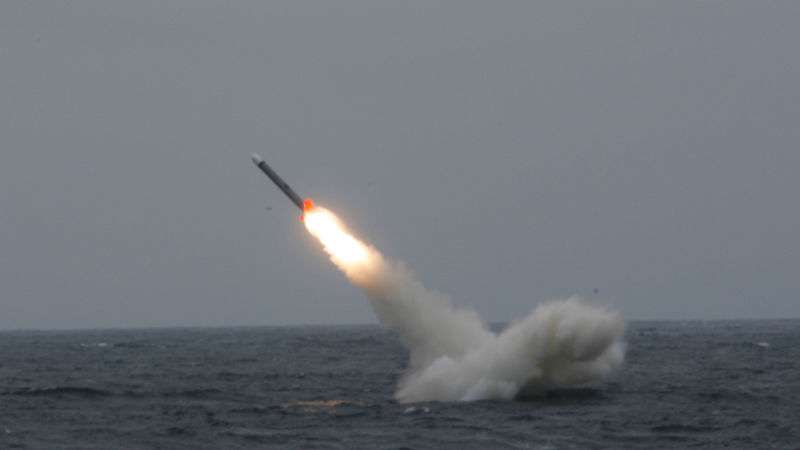The Volokh Conspiracy
Mostly law professors | Sometimes contrarian | Often libertarian | Always independent
The Constitution and Trump's Next Strike Against Syria
A small-scale strike might be constitutional even without congressional support. But it is also likely to be useless, much like last year's missile strike turned out to be. Large-scale military action of the sort that could make a real difference, requires advance congressional authorization.

President Donald Trump is considering launching another military strike against Syria, in realiation for the Assad regime's likely use of chemical weapons against civilians. Trump says that the strike "could be very soon, or not so soon at all." When and if it does come, however, it probably won't have congressional authorization, just like the missile strike he ordered against a Syrian air base last year, after a previous instance of of chemical weapons use by Assad.
As I have emphasized in many previous writings on war powers, the Constitution does not give the president the authority to initiate a large-scale military conflict without congressional authorization. The Founders specifically designed the Constitution to prevent any one man from having the power to take the nation into war. That safeguard is especially important when the presidency is held by a dangerously ignorant demagogue like Trump. But even more conventional presidents often cannot be safely trusted with such authority. Sadly, the requirement of congressional authorization has often been ignored in recent years, including by Barack Obama when he initiated wars against Libya and ISIS. Obama later admitted that the Libya war was his "worst mistake," though he still refuses to see how the error was exacerbated by initiating the war without constitutionally required authorization.
The requirement of congressional authorization for war is not just a legal technicality that only experts have reason to care about. It helps ensure that we don't initiate dubious conflicts at the behest of a single man, and that we maximize the chances of success if we do start a new war. If the president must secure congressional authorization before starting a war, he is forced to build up a broad political consensus behind his decision, which in turn increases the likelihood that we will stay the course until victory is achieved, rather than bail at the first sign of trouble, as Obama arguably did in Libya. In the absence of such broad support, it is usually better to avoid entering a conflict entirely, rather than start one that is likely to go badly.
In my view, a very limited, small-scale use of force, like last year's Syria strike, might be too small to qualify as a "war," and therefore not require congressional authorization. Many other legal scholars disagree, and believe that almost any initiation of force against a foreign power requires congressional authorization. If they are right, last year's attack was unconstitutional, and the same would be true of any attack Trump chooses to launch now.
But even if a small-scale strike might be legal, it is unlikely to accomplish anything useful, as the experience of the last year demonstrates. Conservative commentator (and Iraq War veteran) David French effectively summarizes the flaws of such an approach:
The president was widely (and mistakenly) praised for his first unconstitutional strike against Syria, but it obviously didn't deter future chemical use nor did it slow Assad's advance against Syrian rebels. Dictators are used to taking losses. They don't care about their people, and they can replace lost equipment. Besides, Assad's true military power lies in his alliances with Russia and Iran.
As French notes, Assad and his Russian and Iranian backers seem more than willing to absorb the losses likely to be inflicted by another small-scale strike similar to last year's. They probably view it as just an expected - and acceptable - cost of being in the brutal dictator business.
A more serious effort to overthrow Assad or at least significantly degrade his military capabilities might have a greater effect. But any such intervention would lead to a conflict that is clearly large enough to qualify as a war, by any reasonable standard. It would therefore require congressional authorization. It may be impossible to find the exact point at which a military intervention becomes large enough to count as a "war," thereby requiring congressional authorization. But this would not be a close case.
French correctly emphasizes that a congressional debate might help clarify the very muddled US objectives in the region and promote serious consideration of what exactly we hope to accomplish. If the goal is to deter future use of chemical weapons, we should give thought to the question of whether such uses really are worse than the vastly larger slaughter of civilians that Assad has perpetrated by using conventional arms. So far, the signal the US and most of the "international community" have sent Assad suggests that we don't object too much if he kills large numbers of innocent people, so long as he does it with conventional weapons. And if we truly care about Syrian civilians threatened by warfare and horrible atrocities, we should end Trump's "travel ban" policy, which indefinitely bars nearly all Syrians from entering the United States.
I am more hawkish than the average libertarian, and therefore more open to the idea that military intervention can be beneficial. But any such effort should come only after the president gets constitutionally required authorization, and built up a broad consensus for the sort of action that - unlike last year's feel-good strike - is actually likely to make a difference. If Trump cannot or will not do that, it may well be better not to launch a strike at all.


Show Comments (54)